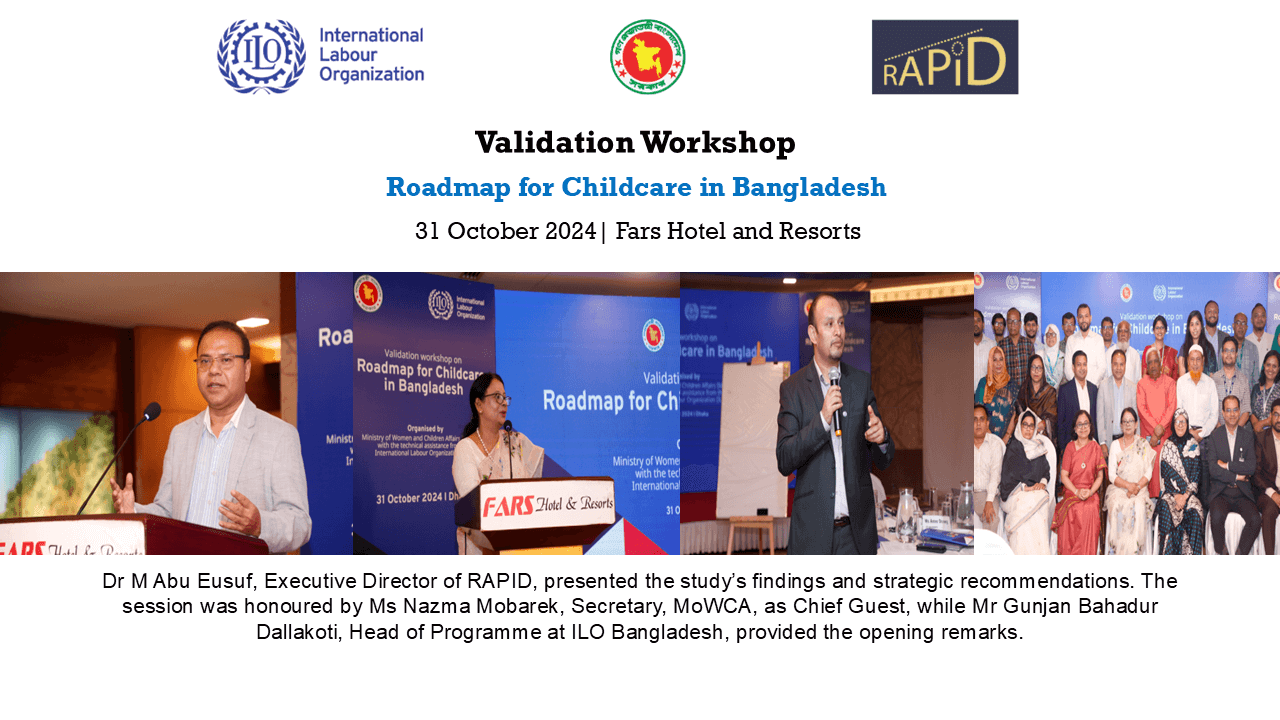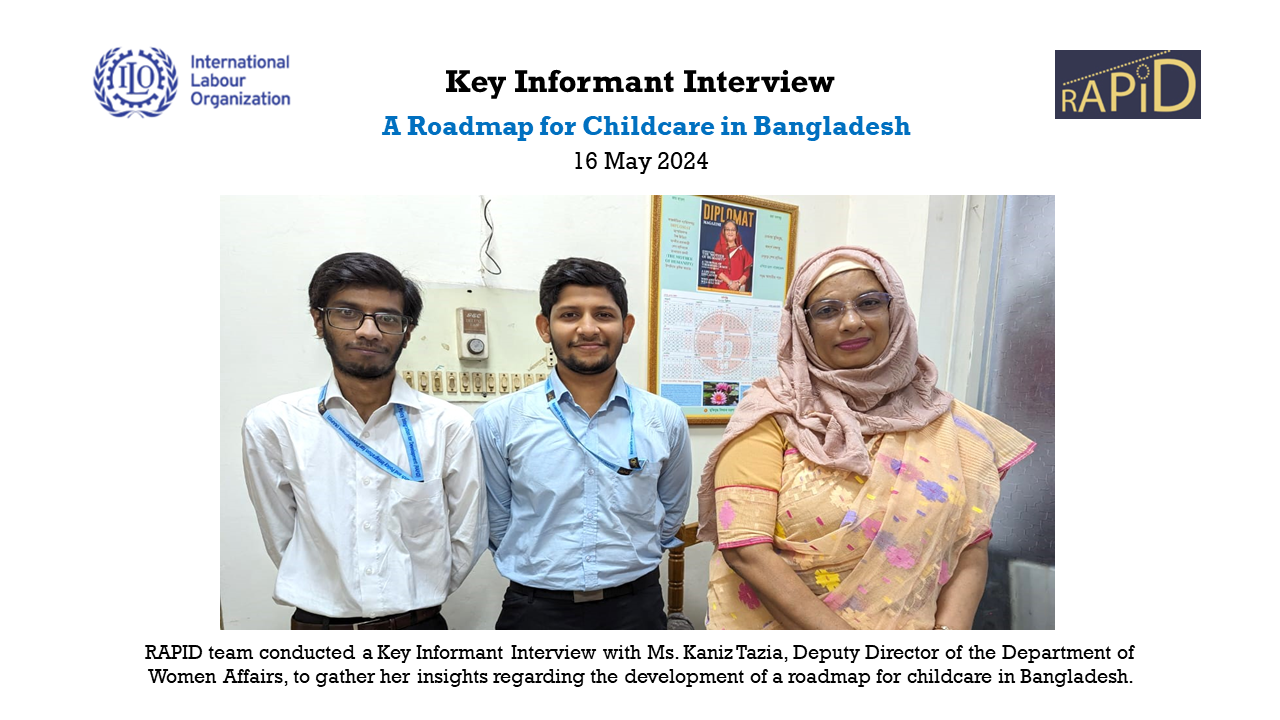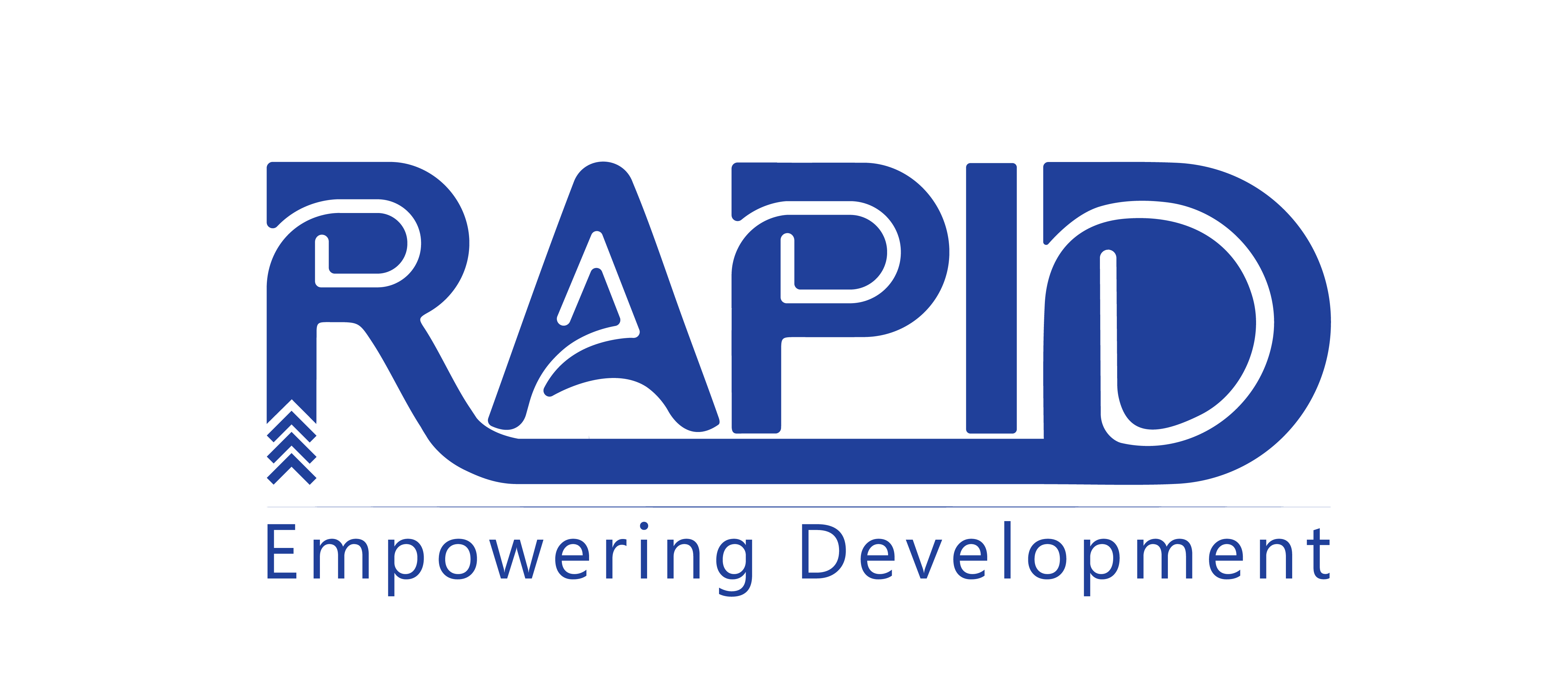
Policy Brief: Is the EU’s incomplete tariff preference a boon or a bane for Bangladesh post-LDC graduation in apparel exports?

Completion of National Baseline Survey on Financial Inclusion in Bangladesh
About the project
Partner: International Labour Organization (ILO)The care economy refers to a diverse range of paid and unpaid activities/work that support caregiving in all its forms. Care is essential for everyone’s physical, psychological, and social well-being, but especially for children, older persons, persons with disabilities, and persons with chronic illness. Women and girls traditionally bear the brunt of care work. Across the world, women and girls are performing more than three-quarters of the total amount of unpaid care work, and two thirds of care workers are women. This unequal gender-based distribution of care work adversely influences women’s paid employment opportunities and treatments. The overburden of care responsibilities negatively impacts the type of paid job opportunities that women access and the conditions and quality of their employment, resulting in the over-representation of women in less favourable employment including in unregulated and informal sector jobs. The Ministry of Women and Children Affairs (MoWCA), the Government of Bangladesh has recognized the importance of addressing challenges associated with unpaid care work and promoting investment in the care economy to advance gender equality and sustainable development. Among care work, childcare has been identified as a key area to strengthen to ensure wellbeing of children and support women9s access to employment and leadership positions. In this context, the ILO Country Office in Bangladesh has been working with MoWCA, and the ILO is seeking a service of a national consultant/consulting institution to contribute to the efforts of strengthening childcare in Bangladesh. To build on the progress so far and to scale up the on-going initiatives to realize accessible and affordable quality childcare supported by workers enjoying decent work, a strategic and step-by-step scale-up approach must be developed and adopted in line with the existing policy frameworks. Thus, it is planned to develop a roadmap for childcare in Bangladesh. The roadmap for childcare in Bangladesh will include a vision and principles for realizing accessible and affordable quality childcare and illustrate a practical plan of actions towards building childcare framework and systems in Bangladesh. It will also outline the engagement of the key actors (state, private sector and market actors) and strategies for sustainable finance for childcare in Bangladesh.
Objective of the Assignment:
The overall objective of this assignment is to contribute to realize accessible and affordable quality childcare supported by workers enjoying decent work in Bangladesh. This assignment specifically has the following objectives:
- To have data/information available to inform the development of a roadmap for childcare in Bangladesh
- To have a roadmap for strengthening childcare in Bangladesh. This roadmap for childcare in Bangladesh will be developed based on a comprehensive analysis of emerging childcare demands, childcare as care work, and thereby inform the pathway to harness the potential of developing the economy around childcare. The assignment is expected to generate data and evidence on the emerging childcare needs and inform the specific policy areas and interventions in developing a robust roadmap for childcare in Bangladesh
Project activities
Launching Event: Roadmap for Childcare in Bangladesh
On 24 November 2024, Research and Policy Integration for Development (RAPID), in collaboration with the International Labour Organization (ILO) and the Ministry of Women and Children Affairs (MoWCA), held a launching event on ‘Roadmap for Childcare in Bangladesh’.Dr M Abu Eusuf, Executive Director, RAPID, delivered the presentation on the Roadmap for Childcare in Bangladesh and provided an overview of the study on childcare. The launching event was graced by Ms Mamtaz Ahmed, Senior Secretary of the Ministry of Women and Children Affairs, as Chief Guest and Ms Keya Khan, Director General, Department of Women Affairs, was present as Special Guest. Dr M A Razzaque, Chairman, RAPID, was also in attendance. Mr Tuomo Poutiainen, Country Director of the ILO, concluded the event with his closing remarks.

Validation Workshop: Roadmap for Childcare in Bangladesh
On 31 October 2024, Research and Policy Integration for Development (RAPID), in collaboration with the International Labour Organization (ILO) and the Ministry of Women and Children Affairs (MoWCA), held a Validation Workshop on '𝐑𝐨𝐚𝐝𝐦𝐚𝐩 𝐟𝐨𝐫 𝐂𝐡𝐢𝐥𝐝𝐜𝐚𝐫𝐞 𝐢𝐧 𝐁𝐚𝐧𝐠𝐥𝐚𝐝𝐞𝐬𝐡'. This event marks an important step forward in the government’s efforts to address childcare needs and develop a sustainable framework for the future.Dr M Abu Eusuf, Executive Director of RAPID, presented the study’s findings and strategic recommendations. The session was honoured by Ms Nazma Mobarek, Secretary, MoWCA, as Chief Guest, and brought together stakeholders from various sectors to provide their insights and validate the roadmap, ensuring it aligns with the needs of children, parents, and caregivers across the country.

Stakeholder Consultation: Roadmap for Childcare in Bangladesh- Initial sharing of key findings
On 3 October 2024, Research and Policy Integration for Development (RAPID), in collaboration with the International Labour Organization and the Ministry of Women and Children Affairs (MoWCA), held a stakeholder consultation at Bangladesh Shishu Academy, where the key findings of the joint RAPID-ILO study on the current state and propose '𝐑𝐨𝐚𝐝𝐦𝐚𝐩 𝐟𝐨𝐫 𝐂𝐡𝐢𝐥𝐝𝐜𝐚𝐫𝐞 𝐢𝐧 𝐁𝐚𝐧𝐠𝐥𝐚𝐝𝐞𝐬𝐡' were presented. This event marks an important step forward in the government’s efforts to address childcare needs and develop a sustainable framework for the future.We were honoured to have Ms Tania Khan, Additional Secretary of MoWCA, deliver the welcome remarks, highlighting the Ministry’s commitment to advancing childcare services. Mr Gunjan Bahadur Dallakoti, Head of Programmes at the ILO Bangladesh, shared valuable insights. Dr Abu Eusuf, Executive Director of RAPID, presented the key findings of the study, providing a clear overview of the challenges and opportunities in the childcare sector. The session concluded with closing remarks from Dr Abdur Razzaque, Chairman of RAPID, who emphasised the need for coordinated action to ensure accessible, affordable, and high-quality childcare services across the country.
A heartfelt thank you to all the esteemed attendees for their valuable contributions and active participation in shaping the future of childcare in Bangladesh. Together, we are moving closer to creating a stronger, more inclusive childcare system for the nation’s children and working families.

Survey: A Roadmap for Childcare in Bangladesh
On 26 May 2024, RAPID team visited Ha-Meem Group's childcare facility centre to conduct a survey, laying the groundwork for a comprehensive childcare roadmap in Bangladesh. The team had in depth discussions with parents, caregivers, and employers to gather important insights on the state of employer-based childcare in Bangladesh.
Key Informant Interview: A Roadmap for Childcare in Bangladesh
On 15 May 2024, RAPID team conducted a Key Informant Interview with Ms. Kaniz Tazia, Deputy Director of the Department of Women Affairs, to gather her insights regarding the development of a roadmap for childcare in Bangladesh. During the session, the team delved into a detailed dialogue about the status of 63 publicly funded day care facilities across Bangladesh, aiming to pinpoint the caregiving framework and key challenges associated with day care services in the country.
`

